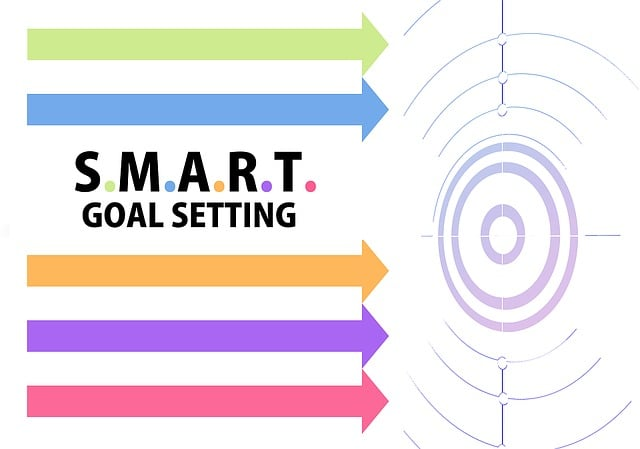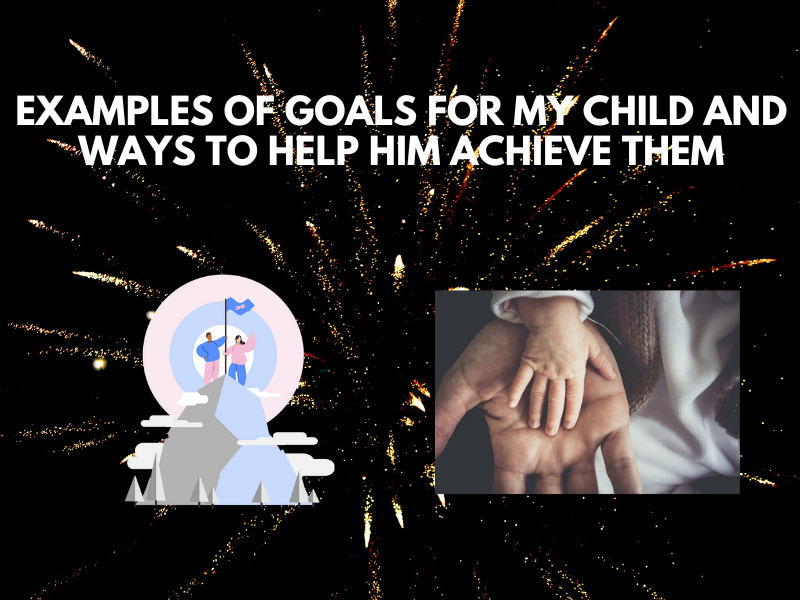Definition of ‘Goal’
A goal is a destination of a journey. It is an objective you are working for. Teaching kids about their goals greatly impact their habitual nature.
These goals become a part of their daily routine and help them throughout their lives. As goal setting is quite hectic for adults, so is for children.
Therefore, they need some assistance from their elders to proceed. As a parent, you must think about what can be “the best examples of goals for my child” that can help your child in building confidence.
While setting goals for a child it is crucial to note that the oriented goals are the goals for your child not for you!
A complete set of goals for a child includes goals about physical wellness, social goals, educational goals, and personal goals.
Examples of Goals For My Child
Here are some examples of goals for your child.
1) Create a Visual Reminder
A visual reminder is a great strategy to pursue the day, it is a kind of to-do work list in an attractive way that helps an individual to remind things.


Goal example: “Today I am going to make a visual reminder after school including the workload of one week.”
2) Improve Self-hygiene
For a healthy lifestyle being healthy is the prior thing to perform the duties actively. So, your child needs to be fit and healthy and he/she should practice healthy activities.
Goal example: “I will wash my hands right after doing anything, will trim my nails every week, and will take a daily shower.”
3) Take a sound sleep
A sound mind can exist in a sound body and adequate rest is necessary for the body to perform well. It is crucial to have proper sleep to spend an active day ahead.


Goal example: “I will go to bed before 8 pm and will get up early in the morning for school.”
4) Eat healthily
Healthy food improves the power of the body and gives positive energy to the mind to deal with complicated situations.
Goal example: “I will avoid junk food and will not miss my meals throughout the day. I will try at least one new fruit or vegetable in a week with my family.”
5) Limit the use of digital devices
Don’t allow your children to spend most of their time using cell phones, TV, Laptops, computer, video gaming, etc.


Goal example: “I will use the phone to play puzzles for 30 minutes and play video games once a day.”
6) Set the social limit
Being social is good but excess of everything is bad. Therefore, like other aspects, the social relations of your child should be limited too.
Goal example: “I will only enjoy only 20 minutes with friends at school and avoid the time-wasting activities at school.”
7) Participate in a School Play
The performances in the school plays are a great way to attain self-confidence and improve communication skills in your kid.


“I will take part in the play that will be performed next week in the school on plant’s day.”
8) Learn a New Sport
As mental growth is possible if the body and mind both are working healthily. So, for a mental balance, extra-curricular activities play a role of a great helper.
Goal example: “I will participate in the basketball practice match this week”
9) Learn a Foreign Language
Learning a new language helps your child to meet new friends and to improve social relations of your child.
Goal example: “This week I will start learning the basics of French.”
10) Practice Playing my Musical Instrument
The extracurricular activities help your child to learn about a new field and people. Moreover, it gives a confidence boost to your child.


Goal example: “I will practice my guitar today after my homework.”
Types of Goals Your Child Should Be Setting (and Why They’re Important for Success)
Goal setting has many benefits over working for a random routine. Being acknowledged of the types of goals is a great starting point for teaching your kids about goal setting.
Parents should be well aware of these types of goals to improve the personality and academic performance of their kids.
Grade-based goals, Habit-based goals, Short-term goals, and long-term goals are some must-to-know types of goals for your child.
These goals develop a sense of responsibility in your child and help them to maintain a balanced lifestyle with a good educational performance.
Examples of Grade-Based Goals for Your Child
These are the goals that maintain the academic performance of the students.
Here are some examples of grade-based goals.
Increasing my time of study to improve my mathematics grade in the next semester.
Targeting 90% in the upcoming semester.
Getting full marks in my next assignment project.


Examples of Habit-Based Goals for Your Child
Habitual goals emphasize making positive habits and the personal development of your child.
Make a to-do list every night before sleeping.
Setting my room clean every day before bed.
Revise my notes for 10 minutes after each class.
Examples of Short-Term Goals
Short-term goals are limited to days or weeks.


They are easy to accomplish by children and adults as well.
Completing my assignment project this week.
Running a Mile in Under 10 Minutes today.
Solving half of the 1st chapter of mathematics today.
Examples of Long-Term Goals
Long-term goals are a combination of short-term goals.
Help your child to re-evaluate their long-term goals, and make sure that their goals should be realistic and achievable.
Getting a certificate in sketching this year.
Working hard to get admission to my dream college this year.
Making notes to prepare for admission tests throughout the year.
Top 10 Educational Goal Examples To Try
1) Stay focused
Staying focused on your goals is the key to achievement.
Goal example: “I will be resilient and will complete my homework throughout this week.”
2) Be motivated
No one can start working without motivation for something. So, being motivated in every situation is crucial to proceed.
Goal example: “I will not give up while practicing the Mathematics exercise today.”
3) Increase my Reading Lexile Level
Students feel difficulty in reading at the early stages. So, it’s of great importance to help out your child by developing their interest in reading by providing some colorful story books.


Goal Example: “Every day I will read an additional storybook for 20 minutes to increase my reading skills this month.”
4) Improve time management
Children are most likely to avoid time management as they are younger enough and procrastinated easily towards other things. But parents should help their children to develop this sense at an early age.
Goal example: “I have to give at least 20 minutes to each subject and 1hr to basketball in a day.”
5) Improve test scores
A good GPA is necessary for the satisfaction of both you and your child, that is why to attain that level of satisfaction and accomplishment an extra working attitude is required.
Goal example: “I will give 30 extra minutes to each subject this week to improve my test scores.”
6) Develop a sense of self-control
Self-control reflects a positive personality and is important for students to accomplish their educational goals.


Goal example: “I will be gentle with everyone in the school and will avoid messing up with friends and junior boys.”
7) Raise my Hand and Participate More in Class
Taking part in classroom activities increases your child’s confidence level and communication skills.
Goal example: “I will raise my hand to answer every question asked by the teacher in the classroom.”
8) Overcome procrastination
Procrastination is the enemy of academic progress. Parents should help their child to overcome procrastination by telling them suitable methods.


Goal example: “Every day during study time if I get a random thought, I will instantly start writing what I am studying to divert my attention towards the subject.”
9) Socialize with peers
Socialization builds the best way to talk to people and to react in new unfamiliar situations.
Goal example: “During the break, I will talk to one new person at the cafeteria every week.”
10) Improve public speaking skills
Being good at public speaking and having conversations with other children enhances the personality of your child.


Goal example: “I will improve my communication skills by having a conversation with elders for 10 minutes daily in the park.
Benefits of Educational Goals
Educational goal setting is necessary for students as it has many benefits for a balanced and improved student life.
Both kids and adults need to set their educational goals to increase their academic performance.


Following are some positive impacts of setting educational goals.
Provides a disciplined way out.
Encourage the child to learn balance in life.
Helps to use the free time effectively.
Give a confidence boost to your child.
Helps in accomplishing a good educational background.
Improves problem-solving skills.
Develop a sense of responsibility.
Helps in achieving big dreams.
5 Tips for Achieving Educational Goals
1) Set real goals
While setting goals make sure the goals to work for should be real and achievable.
Don’t try to set unrealistic goals as they will never work but they can create a problem and eventually the student will become disappointed and will prefer to give up.
2) Break down large goals into several smaller ones
If your child is unable to achieve the tasks in a limited time make this goal smaller and reset the time to achieve the goal. Convert days into weeks and weeks into months.


3) Learn from falling short
If your child is not picking up the concept and is unable to achieve the goal, it’s ok don’t pressurize him/her to work on it. Instead, you should talk about the benefits of the time he/she has spent working on that goal and help them to reset a new easier goal.
4) Consult your seniors
If your child is facing some problem in any subject you should try to give him/her confidence to talk to a senior student or teacher to help your child. Or it will be easier for the child to get a good idea from you about the problem.
5) Make flexible plans
If something is not working don’t hesitate to change the plan as your child has to be better gradually not an abrupt perfectionist.
What Is A SMART Goal?
SMART is an acronym for Specific, Measurable, Achievable, Relevant, and Time-Bounded.
So, a SMART goal always fulfills the above-mentioned criteria of each term.
Specific : Direct and clear
Measurable : includes quantification of the task.
Achievable : realistic and easy to work on.
Relevant : According to the need and interest.
Time-Bound : includes a boundary limit of time.
Setting SMART goals
Setting SMART goals helps your child to achieve them faster. After listing the goals, the major thing is to be on track toward these goals.


Let’s talk about every word of SMART to have an acknowledgment so may it becomes easier to set SMART goals for kids.
Specific
The goal to be set should be specific in the way that it should include the answers to why, what, who, when, and where.
Measurable
A measurable goal includes the quantification of the goal i.e., how many, how much, to what extent et.
Achievable
Consider the abilities of your child and set a goal that is achievable for him.
Relevant
The relevant goal should be realistic according to the interests of the child.
Time-Bound
There should be a time limit for every goal. The deadlines help to complete the task earlier i.e., days, weeks, or years.
What Is A Smart Goal Example For Kids?
I will get ready on my own for school today.
I will take bath every day before bed.
I will complete my homework before bed.
I will share my toys with my brother today.
I will manage to play with friends in the park.
What are Parental Goals For Their Child?
Following are some great goals for parents to set.


Learn patience to deal with kids.
Try to be kind to kids in any situation.
Improve your sense of critical thinking to observe your child.
Be aware of the potential and interests of your child.
Be a positive role model for your kid.
Develop a supportive attitude.
Always encourage your kid.
Use These Tips to Make Goal-Setting Fun for Your Kids
Following are the best ways and tips to help your child to make goal-setting fun for him.
1. Give a Free Hand to Your Kid in Choosing a Goal
Don’t pressurize your child to set goals that are not a cup of their tea. Allow them to set goals according to their interests and potential.
2. Teach the Language of Goal-Setting
Make sure that as a parent you have provided all the guidance to your kids when they are given free hand to set goals.


You should tell them the purpose and advantages of goal setting so may they can take interest in this process.
3. You’re Ready to Set SMART Goals with Your Kids
Help your child to set the SMART goals and check the goals according to the SMART goal formula so may your child can build a good plan to work on.
4. Give confidence to your child
Always admire the child and give them confidence as they are doing great. It is necessary to conversate about the purpose and the impact of the goal. Talking to children about the positive aspects of goals will lead to building confidence in your child.
5. Flexibility in goals
Don’t be rigid about performing the tasks, if something is not working, go back and re-evaluate it, and encourage your child to do it better than before.
6. Brainstorming through games
In case your child is getting bored and demotivated from the schedule give them access to some puzzle games, prodigies, and brainstorming activities.


These activities will help him to develop an interest in things.
7. Give compliments
Always give compliments to your child on their achievements whether big or small. Give them surety that their accomplishments matter a lot.
It will boost the confidence of your child and will produce an erg to learn more.
8. Give rewards
Giving rewards upon completion of tasks is the best strategy to build interest in work.


Tiny rewards like a cupcake, ice cream, a bar of chocolate, and some sweets will make the child happy and active toward learning.
Evaluating And Achieving Goals
It’s not sure all the time that a goal is being achieved by a child within the given time but every child has his/her ability to complete a task.
Therefore, it is necessary to evaluate the goals. Following are some tips to evaluate the goals.
Visualize the progress of the kid
Reset the goal upon a difficulty faced by a kid
Give a flexible time limit
Encourage the child
Give positive feedback
Conclusion
Thank you for reading the article I hope it has helped you as a parent to set SMART goals for your child. You can consult the portion “examples of goals for my child” for some suggestions. Have a good day!



